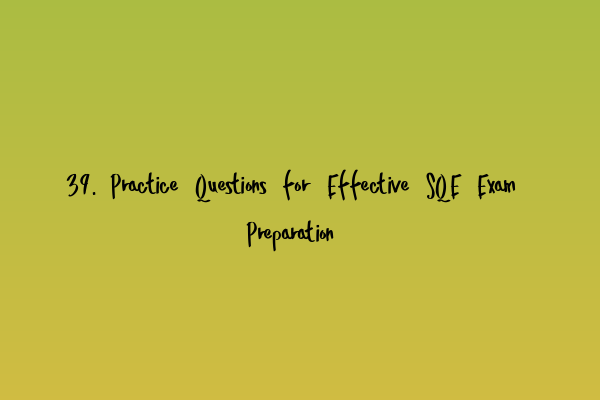39 Practice Questions for Effective SQE Exam Preparation
If you’re preparing for the Solicitors Qualifying Examination (SQE), you know just how important it is to have a solid study plan in place. One crucial aspect of that plan is practicing with exam-style questions. By answering practice questions, you can assess your knowledge, identify any gaps in your understanding, and familiarize yourself with the exam format. In this blog post, we have compiled 39 practice questions to help you effectively prepare for the SQE exam.
Before we dive into the practice questions, let’s briefly discuss why practicing with questions is beneficial for your SQE exam preparation:
- Accurate Examination Reflection: Practice questions are designed to mirror the format and content of the actual SQE exam. By answering similar questions, you gain insight into the types of questions you may encounter on test day.
- Improved Understanding and Retention: Consistent practice improves your understanding of key legal concepts and principles. By testing yourself with practice questions, you reinforce your learning and enhance your ability to recall information during the exam.
- Time Management Skills: The SQE exam is time-pressured, and managing your time effectively is crucial. Regular practice with timed questions helps you develop the necessary skills to handle the time constraints of the exam.
- Confidence Boost: Answering practice questions successfully can boost your confidence, reducing anxiety and stress. Confidence is key to performing well on the SQE exam.
Now, let’s get started with the 39 practice questions:
- What are the key requirements for a valid contract?
- Explain the difference between an offer and an invitation to treat.
- Discuss the elements necessary for the formation of a valid trust.
- What is the rule against perpetuities, and why is it important in property law?
- Define and distinguish between murder and manslaughter.
- What are the essential elements of a negligence claim?
- Discuss the concept of vicarious liability in the context of an employer-employee relationship.
- Explain the doctrine of frustration and its impact on contract law.
- What are the main purposes of criminal sentencing?
- Distinguish between documentary credits and standby credits.
- Discuss the legal requirements for a valid will.
- Explain the doctrine of precedent and its role in the English legal system.
- What are the key principles of European Union law?
- Describe the process of obtaining a patent.
- Discuss the tests and criteria for establishing a valid claim of unfair dismissal.
- Explain the difference between common law and equity.
- What are the factors considered in determining whether a misrepresentation is innocent, negligent, or fraudulent?
- Discuss the elements necessary to establish a claim of defamation.
- Explain the doctrine of frustration and its impact on contract law.
- What are the main purposes of criminal sentencing?
- Distinguish between documentary credits and standby credits.
- Discuss the legal requirements for a valid will.
- Explain the doctrine of precedent and its role in the English legal system.
- What are the key principles of European Union law?
- Describe the process of obtaining a patent.
- Discuss the tests and criteria for establishing a valid claim of unfair dismissal.
- Explain the difference between common law and equity.
- What are the factors considered in determining whether a misrepresentation is innocent, negligent, or fraudulent?
- Discuss the elements necessary to establish a claim of defamation.
- Explain the principle of non-discrimination in employment law.
- What are the key requirements for a valid contract of sale under the Sale of Goods Act 1979?
- Discuss the rights and duties of landlords and tenants in a residential tenancy agreement.
- Explain the principle of proportionality in human rights law.
- What are the essential elements of a valid agreement in contract law?
Remember to check your answers and review the explanations for any questions you may have answered incorrectly. Learning from your mistakes is an essential part of the learning process, and it will help you strengthen your understanding of the law.
For more practice questions and comprehensive SQE exam preparation, be sure to explore our extensive range of SQE 1 Practice Exam Questions and SQE 1 Practice Mocks FLK1 FLK2. Additionally, if you’re preparing for the SQE 2 exam, we offer SQE 2 Preparation Courses. Visit our website to access a wealth of resources to help you succeed in your SQE exams.
It’s also important to stay up-to-date with the latest information related to the SQE exams, including exam dates and important deadlines. Check out our article on SRA SQE Exam Dates to ensure you have all the information you need.
Practice makes perfect, and by dedicating time to answering practice questions, you are taking an important step towards exam success. So, take advantage of these practice questions, commit to your study plan, and give it your all. Good luck!
